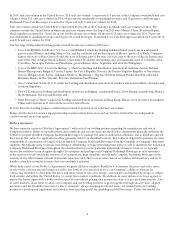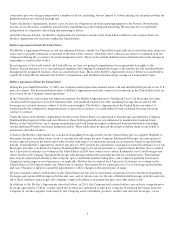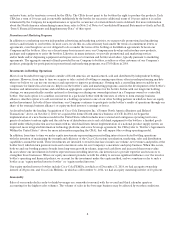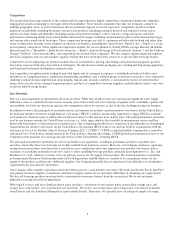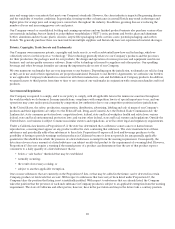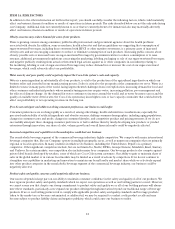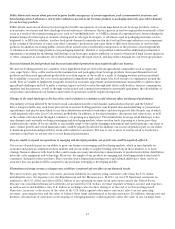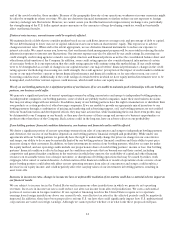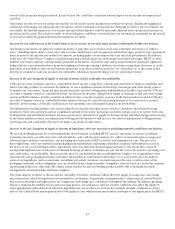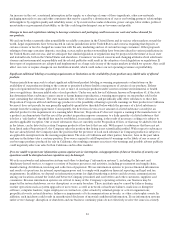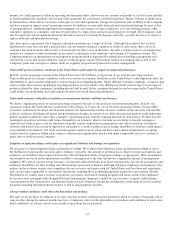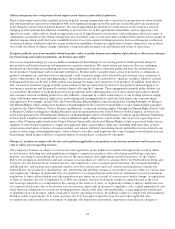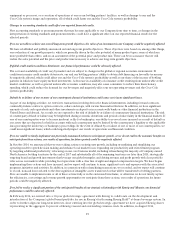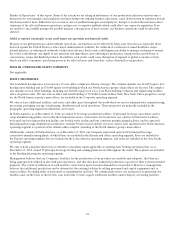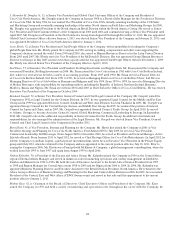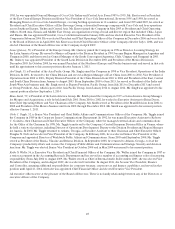Coca Cola 2014 Annual Report Download - page 18
Download and view the complete annual report
Please find page 18 of the 2014 Coca Cola annual report below. You can navigate through the pages in the report by either clicking on the pages listed below, or by using the keyword search tool below to find specific information within the annual report.16
An increase in the cost, a sustained interruption in the supply, or a shortage of some of these ingredients, other raw materials,
packaging materials or cans and other containers that may be caused by a deterioration of our or our bottling partners’ relationships
with suppliers; by supplier quality and reliability issues; or by events such as natural disasters, power outages, labor strikes, political
uncertainties or governmental instability, or the like could negatively impact our net revenues and profits.
Changes in laws and regulations relating to beverage containers and packaging could increase our costs and reduce demand for
our products.
We and our bottlers currently offer nonrefillable recyclable containers in the United States and in various other markets around the
world. Legal requirements have been enacted in various jurisdictions in the United States and overseas requiring that deposits or
certain ecotaxes or fees be charged in connection with the sale, marketing and use of certain beverage containers. Other proposals
relating to beverage container deposits, recycling, ecotax and/or product stewardship have been introduced in various jurisdictions in
the United States and overseas, and we anticipate that similar legislation or regulations may be proposed in the future at local, state
and federal levels, both in the United States and elsewhere. Consumers’ increased concerns and changing attitudes about solid waste
streams and environmental responsibility and the related publicity could result in the adoption of such legislation or regulations. If
these types of requirements are adopted and implemented on a large scale in any of the major markets in which we operate, they could
affect our costs or require changes in our distribution model, which could reduce our net operating revenues or profitability.
Significant additional labeling or warning requirements or limitations on the availability of our products may inhibit sales of affected
products.
Various jurisdictions may seek to adopt significant additional product labeling or warning requirements or limitations on the
availability of our products relating to the content or perceived adverse health consequences of certain of our products. If these
types of requirements become applicable to one or more of our major products under current or future environmental or health
laws or regulations, they may inhibit sales of such products. Under one such law in California, known as Proposition 65, if the state
has determined that a substance causes cancer or harms human reproduction, a warning must appear on any product sold in the
state containing that substance. The state maintains lists of these substances and periodically adds other substances to these lists.
Proposition 65 exposes all food and beverage producers to the possibility of having to provide warnings on their products in California
because it does not provide for any generally applicable quantitative threshold below which the presence of a listed substance is
exempt from the warning requirement. Consequently, the detection of even a trace amount of a listed substance can subject an
affected product to the requirement of a warning label. However, Proposition 65 does not require a warning if the manufacturer of
a product can demonstrate that the use of the product in question exposes consumers to a daily quantity of a listed substance that
is below a “safe harbor” threshold that may be established, is naturally occurring, is the result of necessary cooking or is subject to
another applicable exception. One or more substances that are currently on the Proposition 65 lists, or that may be added to the lists
in the future, can be detected in certain Company products at low levels that are safe. With respect to substances that have not yet
been listed under Proposition 65, the Company takes the position that listing is not scientifically justified. With respect to substances
that are already listed, the Company takes the position that the presence of each such substance in Company products is subject to
an applicable exemption from the warning requirement. The state of California and other parties, however, have in the past taken
and may in the future take a contrary position. If we were required to add Proposition 65 warnings on the labels of one or more of
our beverage products produced for sale in California, the resulting consumer reaction to the warnings and possible adverse publicity
could negatively affect our sales both in California and in other markets.
If we are unable to protect our information systems against service interruption, misappropriation of data or breaches of security, our
operations could be disrupted and our reputation may be damaged.
We rely on networks and information systems and other technology (“information systems”), including the Internet and
third-party hosted services, to support a variety of business processes and activities, including procurement and supply chain,
manufacturing, distribution, invoicing and collection of payments. We use information systems to process financial information
and results of operations for internal reporting purposes and to comply with regulatory financial reporting and legal and tax
requirements. In addition, we depend on information systems for digital marketing activities and electronic communications
among our locations around the world and between Company personnel and our bottlers and other customers, suppliers and
consumers. Because information systems are critical to many of the Company’s operating activities, our business may be
impacted by system shutdowns, service disruptions or security breaches. These incidents may be caused by failures during
routine operations such as system upgrades or user errors, as well as network or hardware failures, malicious or disruptive
software, computer hackers, rogue employees or contractors, cyber-attacks by criminal groups or activist organizations,
geopolitical events, natural disasters, failures or impairments of telecommunications networks, or other catastrophic events. In
addition, such incidents could result in unauthorized disclosure of material confidential information. If our information systems
suffer severe damage, disruption or shutdown and our business continuity plans do not effectively resolve the issues in a timely


